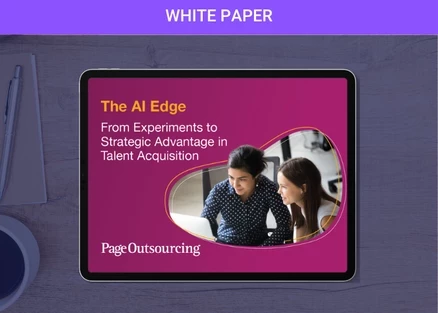Redefining Capabilities for the Digital Evolution – 6 Skills You Need to Succeed in the New Shared Services
Add bookmarkAs Shared Services become more tech-enabled and move up the value curve, traditional skillsets need to evolve and leaders need to consider how to design their workforce to be more innovative and collaborative
Introduction
For operational leaders tasked with building a strong, integrated services network across their organisation, getting talent right is a key strategic enabler. But while the Shared Services value proposition of the past was based on the idea of doing things ‘better, faster, and cheaper’ – that of the future is being tipped upside down, with the advent of intelligent automation into the workplace. ‘Robotic’ type work is being taken out of the human and handled by smart technology. The impact of this digital augmentation on the human workforce is nothing short of revolutionary. The key is to prepare by rewiring the organisation for automation – starting with your team.
Those that don't want to be taken by surprise and suffer the upheavals that come with revolution, should be thinking ahead now.
What's going to change:
- digital systems working side-by-side with humans
- human time freed up for more 'intelligent' value-added work
- ability to scale without adding headcount
- customers taking transactional execution for granted; looking for analytics and insights to shift the needle on performance.
- services defined by alignment, analysis and collaboration
- aging workforce
New Skills in Demand
While the requirements for traditional transactional specialists is diminishing, it's not easy to redeploy individuals who are used to high-volume processing into validation work. This requires a completely different skill set.
Today’s buzz is about augmenting the workforce with digital capabilities. This means developing robotic automation capabilities, to drive the automation that frees up critical time and encourages the reengineering of business processes. As a result, new skills that will become more valuable include understanding coding and structure to make processes more binary and automatable. The future is about thinking like a computer and designing for automation.
Another skill that will become more valuable is that of business analyst, critically evaluating why things are done in a particular way. Many of today's technologies are having a transformational impact and will drive us to question the very processes we have come to accept as grandfathered in.
The objective is to be able to offer business customers support on trends, KPIs, and metrics, alongside the kind of predictive analytics that helps the business identify not just internal best practices, but also identify where operations might be under pressure in future. Data mining and analysis skills are key here, to provide the relevant intelligence to the business. It means, for example, putting measures in place for high risk areas to minimize their impact.
Customers are looking for services that provide more than competitive price and quality, which are now table stakes. Given the hours freed up by automation, this presents an opportunity to consider “what else” you can do for your customer, focusing on their pain points, for example. Outcome-based service is the new catchphrase. Millennials just aren't hardwired for transactional activities, so differentiate your services by taking advantage of new technologies to shift to an outcome based conversation with customers. With the trend towards digitizing customer service … apps, online engagement and mobile are becoming more relevant. These are areas that Millennials thrive in. Smart leaders, like HSBC’s Vikram Bose, play to these strengths to provide lucrative and challenging careers. One of the priorities for all shared services centers, he says, is to elevate the perception of the work being done in shared services. "I tell my team, 'Every trade you settle is the money that our bank relies on'," he says. “This activity that we do … it is the business!”
Another trend is to expand Shared Services impact by extending to front of house functions rather than playing in the back of the house. In other words: customer engagement rather than transactions. Many automation technologies enable just that, by taking transactions off the table and supporting more customer-focused services. This, it turns out, is what Millennials are looking for: stimulating projects that empower them to figure out a better way of doing things.
Want to learn more? You can at SSO Week Autumn – sign up and join the sessions below!
Evolving Talent to Meet the Needs of the Digital Future
Everyone’s talking about digital disruption. But, how is digital disrupting our talent? Join this workshop to find out how to take a legacy shared services center and evolve it for the future, and the best skills needed for the future. With: Janet Ramey, SVP, Employee Services, Cisco and Heather Yurko, Chief of Staff, Employee Services and Lead, Future of Work, Employee Service, Cisco
Also sessions on: Driving Human Centered Design and User Experience through Shared Services
While functional knowledge is important, the skill sets SSO leaders are now prioritizing include the ability to manage stakeholder engagement. Negotiating, understanding different cultures and how people work … these are all crucial skills, and hard to teach. “We encounter a lot of resistance,” one SSO leader explains, “so it's important that the team is able to adjust its approach according to the seniority of the stakeholders we deal with, as well as the countries in question.”
Naturally, as work moves forward, the initial excitement wanes and there's a certain expectation around ‘What's next’? The key is to leverage innovation as a motivator – employees want to be involved with analytics and robotics and are attracted by the continuous improvement challenges of moving towards end-to-end solutions. In HR, for example, the hire-to-onboarding process offers opportunities to collaborate with IT and partner with finance.
Summary: Staying ahead of the curve
Developing talent is every SSO leader’s number one priority. The compelling driver is to constantly adapt to the new environment or risk being left behind. One strategy to leverage collective skills is to promote rotation across departments. This exposure to different work is extremely valuable in driving people to think outside the box. Combined with a sense of responsibility and empowered decision-making, it’s a winning combination.




























